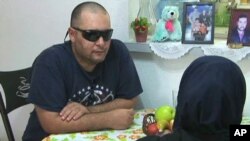The U.S. government has dramatically increased the number of Iraqi refugees it allows into the United States. In fiscal year 2009, the U.S. took in nearly 19,000 Iraqi refugees, up from just 200 in 2006. But as Steve Mort reports from Tampa, Florida, for many refugees from Iraq, starting life anew in America is not easy.
Learning the language of their new country, Hayder Abdul-Wahab and his wife Iman study English every day. The couple and their two children came to the United States as refugees in 2008.
Abdul-Wahab is blind, the result of a bomb blast in Baghdad. He receives limited public assistance, but without a job, he says the money is not enough to support his family.
"The job, it's so hard, it's difficult here," he said. "Because, you know, I can't work because I am blind, I can't see. My wife, she hopes to get work. She [is] going to everywhere that take applications. All the markets here. But still, she [doesn't] have work."
Abdul-Wahab says his children are adjusting to school in their new country. But he says he worries he won't be able to afford essentials for Hussein, 5, and Gailan, 9.
Some refugee support groups claim Iraqis are not getting enough help from the U.S. government.
"They're not receiving the basic support they need to provide them some sort of stable future," said Bob Carey with the International Rescue Committee. "The economic decline also made it much more difficult for refugees who are entering this country to find jobs."
Abdul-Wahab keeps in touch with developments in Iraq where he was a security guard for American troops. He fled in 2007, fearing reprisals.
The U.S. State Department's Eric Schwartz says the U.S. spends hundreds of million of dollars annually to help displaced people and refugees from Iraq relocate in the U.S. and elsewhere.
"No refugee will be guaranteed success," noted Schwartz. "But we are obliged to provide them the resources they need so that they can get on their feet. And if they work hard, like refugees have throughout history, they can succeed."
The Abdul-Wahabs meet regularly with a case worker from a local non-profit agency that helps refugees adjust to their new lives. Hayder Abdul-Wahab's father and brother were both killed in Iraq. He says he does not regret leaving his country. But he says it will take some time for his family to feel fully at home in the United States.










